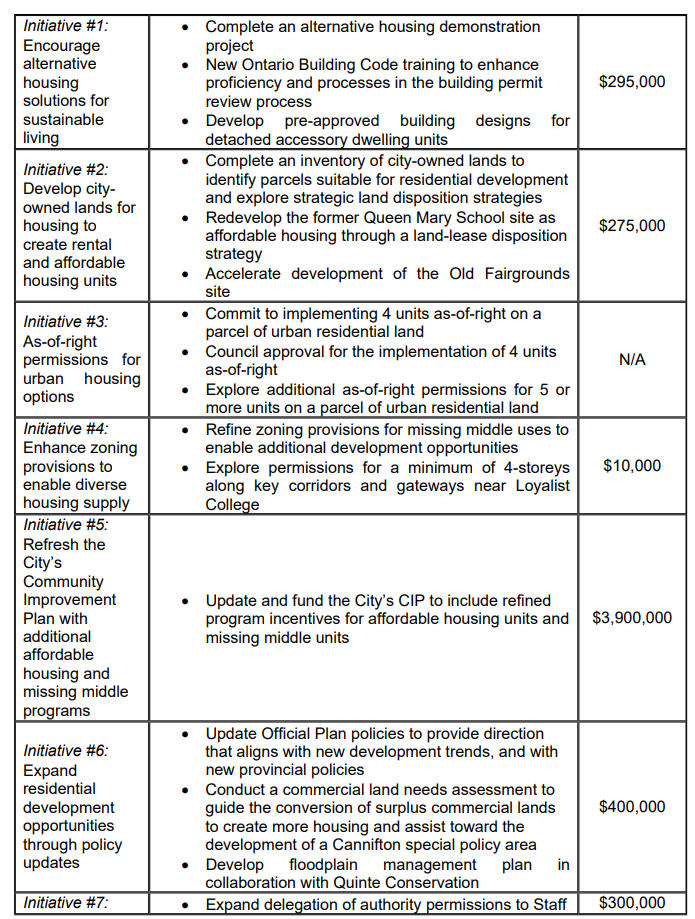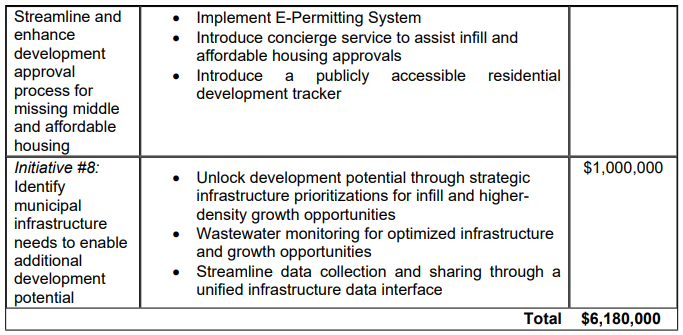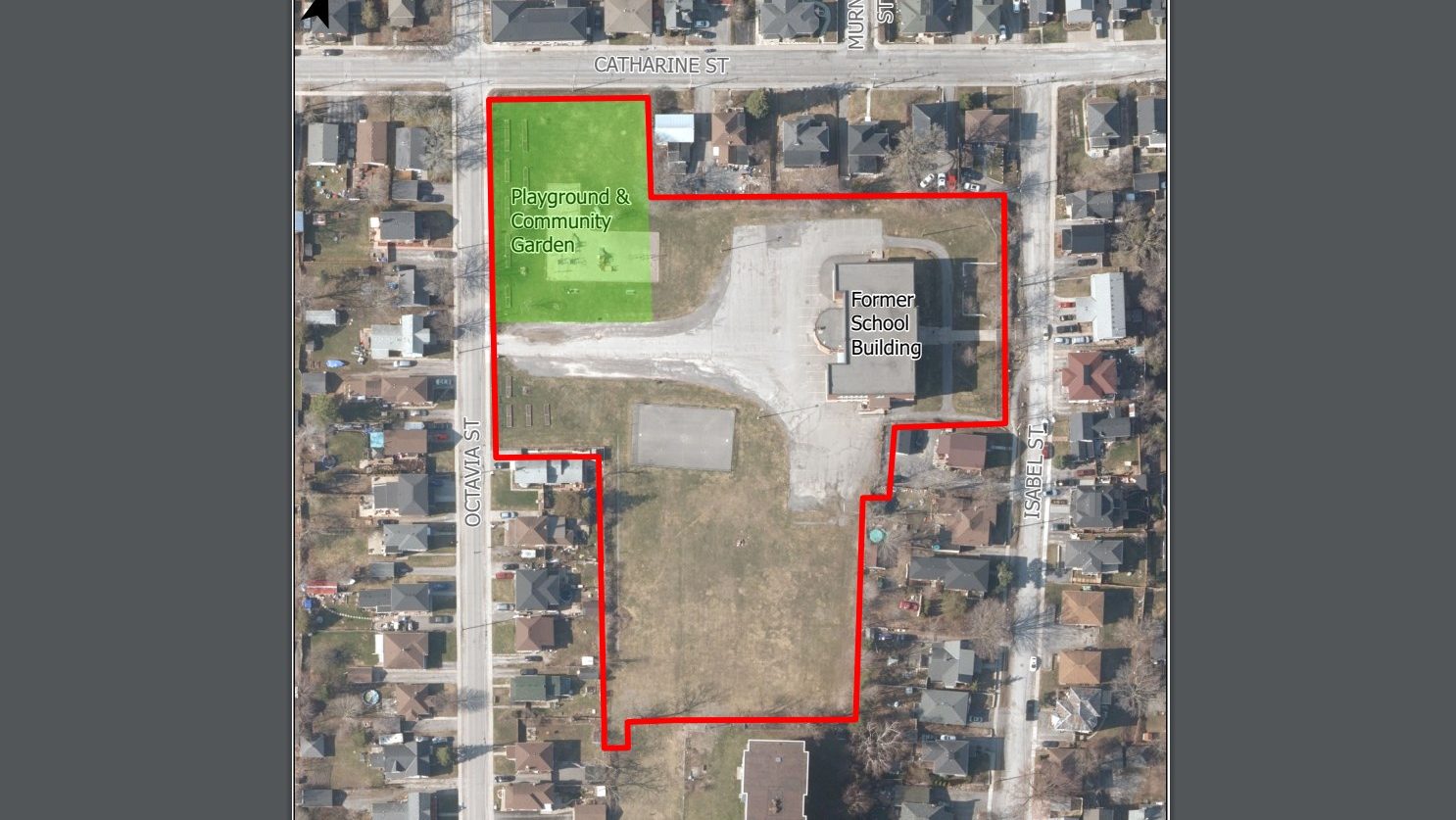Belleville applied to the first round of the $4 billion federal Housing Accelerator Fund (HAF) for up to $22.3M to build an estimated 875 housing units, but was denied.
It was generally understood that to get funding, municipalities had to agree to change their zoning bylaws to allow the development of 4 units as-of-right (eg. fourplexes) on residential properties to received HAF funding, but Belleville’s application did not include this update. 179 other communities across Canada received funding.
The Ford government mandated 3 units as-of-right in Ontario in Bill 23, More Homes Built Faster Act, 2022, but special zoning approvals are needed to build fourplexes in many Ontario municipalities. Under 3 units as-of-right, Belleville currently allows up to 2 accessory dwelling units (ADU) on existing residential properties (eg. 1 basement apartment and 1 separate unit). Here’s what accessory dwelling units, triplexes and fourplexes in other Ontario communities look like.
On September 9, 2024 council agreed in principal pending a public consultation to re-apply to the HAF for $16.8M to add an estimated 460 additional units over 3 years by allowing 4 units as-of-right on an urban residential lot.
Studies indicate that residential intensification and higher density development is cheaper for the municipality to service, which means lower property taxes:
A 2021 report for the City of Ottawa found that to serve low-density homes built on undeveloped land (eg. suburban detached single family homes, or “sprawl”) it cost the city $465 per capita more than it returned in property taxes and water bills, per year, while high-density infill development (eg. apartment buildings) pays for itself and produces a surplus of $606 per capita, per year.
Housing Accelerator Fund program
To participate, municipalities are required to develop a HAF Action Plan as the basis of their application. The Action Plan must set out a housing supply growth target as well as specific initiatives that the municipality will undertake to meet the growth target. Growth is measured by the number of permits issued for new units. In setting a growth target, municipalities are required to calculate their baseline growth for net-new permits based on historical data and then commit to accelerating this baseline growth by a minimum of 10 per cent over the next
three years.
The HAF Action Plan must identify a minimum of seven initiatives that will be undertaken to meet this growth target. All initiatives selected must be implemented and completed within two years of the commencement of the HAF program.
Timeline
Belleville has not made their Housing Action Plan or HAF application available to the public, unlike the City of Quinte West which published a staff report on May 31, 2023, a presentation, a Housing Action Plan and has an information page.
September 26, 2024 – Public information centre at Parkdale Community Centre (119 Birch St.) from 4:30 to 6:30 pm
We have initiated a project to increase opportunities for “missing middle” housing options, including permitting four-unit dwellings on urban serviced properties and we want your feedback. A public information centre will be held on Sept. 26 from 4:30 to 6:30 pm at the Parkdale Community Centre (119 Birch St.) to provide more information and gain feedback.
The public open house will get feedback from individuals who might have some ideas, suggestions, concerns, and that’ll be incorporated into a report back to the planning advisory committee that will consider the application by the city
Director of Engineering and Development Services Stephen Ashton
For more information on this project and to submit feedback online, visit www.belleville.ca/ResIntensification.
Discussion on Belleville Neighbors Facebook Group
September 9, 2024 – MP Ryan Williams urges federal government to grant Housing Accelerator Fund requests for Bay of Quinte
Bay of Quinte MP Ryan Williams is urging the federal government to reconsider its approach to allocating the Housing Accelerator Fund. “The City of Belleville and every other municipality in our region were shut out of the Accelerator Funding process,” said MP Williams. “Only one municipality in the entire Eastern Ontario region received any of this critical funding. The Bay of Quinte is in a housing crisis, and I would hope this Liberal Government would recognize the urgency of the situation.”
MP Williams pointed out that this issue isn’t just isolated to Belleville but also affects Quinte West and Prince Edward County. “These communities have collectively spent hundreds of hours of staff time trying to secure this much-needed funding, yet we’ve seen no success. This failure lies squarely at the feet of the Liberal government, which continues to withhold funding from the areas that need it the most.
MP Ryan Williams
September 9, 2024 – Council votes to re-apply to the HAF for $16.8M to add an estimated 460 additional units over 3 years, allowing 4 units as-of-right on a parcel of urban residential land
Minimum requirements for HAF2 are:
- Minimum annual growth rate of 1.1%
- Minimum annual growth rate percentage change of 10%
- Commit to implementing four units as-of-right
- Submit an action plan with a minimum of seven initiatives
- Complete or update a Housing Needs Assessment report and
- Submit periodic reports to CMHC
Belleville’s Action Plan 2


I expressed last application that we weren’t explicit on the four units, as I was watching decision trends across the city and the Federal Minister of Housing blasting back to some mayors in writing to basically say it’s either four units as-of-right or no money
So it’s good that we’ve picked up on that messaging, if you will. We’ve learned our lesson that we weren’t successful in round one, and hopefully we’ll see better success in round two.
Councillor Paul Carr
July 15, 2024 – Housing Accelerator Fund Round 2 launches with $400M in 2024 Federal Budget 2024 top-up, for previous applicants only
Federal Budget 2024 announced a top-up of $400 Million over four years to the Housing Accelerator Fund (HAF) – Round 2 specifically for applicants who weren’t approved the first time around, which will help fast-track approximately 12,000 new housing units in the next three years.
March 6, 2024 – PEC Mayor Ferguson says Belleville and Quinte West have had their HAF applications denied
February 27, 2024 – HAF projects outlined in the 2024 Operating Budget, waiting to be funded by application approval
The following projects in the 2024 Operating Budget will be funded by non-tax revenues and will begin once Belleville’s Housing Accelerator Fund application is approved and the funding is received from the Federal government. Project award and completion is contingent on Federal Housing Accelerator Fund grant being received.
HAF Initiative #2: Surplus Land – $275K
Need to create a process for the disposal of city-owned land asset for the development of affordable housing. Includes conducting a
housing needs assessment; an inventory of citywide lands for infill/ intensification potential; a series of development prospectuses for
Belleville’s city-owned lands; streamlining processes to facilitate development; and marketing of city-owned sites to attract
development partners for affordable housing units.
Project award and completion contingent on Federal Housing Accelerator Fund grant being received.
HAF Initiative #3: Updating Zoning for Future Development – $100K
Need to promote more diversity in development forms without the need for rezoning (as-of-right zoning). Includes a survey of missing middle housing forms in the City to identify suitable locations and design parameters; and expediting the new zoning by-law to facilitate faster development of a variety of forms of housing units and reduce barriers to increasing supply of affordable housing and missing middle housing.
Project award and completion contingent on Federal Housing Accelerator Fund grant being received.
HAF Initiative #4: Infrastructure Planning – $100K
Need to update infrastructure planning to align with the newly-approved Official Plan, vision of growth and sustainability, housing needs assessment. Includes conducting a citywide, targeted Infrastructure Phasing Program, prioritizing residential development to strengthen the housing supply.
Project award and completion contingent on Federal Housing Accelerator Fund grant being received
HAF Initiative #5: Accessory Dwelling Units (ADUs) – $3.2M
Need to encourage ADUs – smaller accessory units on the same property as a primary unit. Includes developing pre-approved potential designs of ADUs; creating a marketing program to increase awareness of the ADU funding programs and Community Improvement Plan (CIP); increasing the budget for the CIP’s incentives for affordable and accessory dwelling units; increasing staffing support to facilitate expedited CIP incentives and initiatives; and waiving permitting fees associated with the CIP ADU Program.
HAF Initiative #6: Infill Development – $125K
Need to encourage infill development (adding additional units to existing developments) with increased densities and housing mix. Includes emphasizing increased densities and neighbourhood reinvigoration and revitalization. Includes developing a policy to fasttrack Priority #1 and Priority #2 Areas (areas primed for intensification in proximity to the City’s highest volume transit routes); and updating internal business processes with the intention of fast-tracking Priority Areas.
HAF Initiative #7: Housing Constraints and Supply – $800K
Need to implement new/ enhanced processes or systems such as case management, e-permitting and building permitting modelling/monitoring. Includes developing a floodplain management plan in collaboration with Quinte Conservation; implementing an ePermitting system; and implementing the online engagement platform “Bang the Table” into existing digital infrastructure.
Project award and completion contingent on Federal Housing Accelerator Fund grant being received.
August 14, 2023 – Council approves Housing Accelerator Fund application for up to $22.3M
The Housing Action Plan indicates the City can anticipate issuing an additional 875 housing unit permits over the next three years with the HAF funding. The initiatives will include:
Housing Accelerator Fund Application staff report
- Create a process for the disposal of city-owned land assets for the development of affordable housing as-of-right (not requiring rezoning).
- Promoting various development forms without the need for rezoning (as-of-right zoning).
- Update infrastructure planning to align with the newly-approved Official Plan, growth targets, and housing needs assessment.
- Encouraging Affordable Units and Accessory Dwelling Units under the Community Improvement Plan’s incentive programs.
- Encouraging infill development (adding additional units to existing developments) with increased densities and housing mix.
- Promoting development by addressing floodplain risk (i.e., reduce the lands constrained by flooding), and increase the available lands for development.
- Encouraging alternative forms of housing construction such as modular housing, manufactured housing, and prefabricated housing.
this does not necessarily need to be affordable housing or social housing, this just needs to accelerate housing in general. So, a lot of these projects are for a lack of a better word, are accelerating opening up lands for development.
Stephen Ashton, Director of Engineering and Development Services



Comments
We want to hear from you! Share your opinions below and remember to keep it respectful. Please read our Community Guidelines before participating.